|
|
|
Sort Order |
|
|
|
Items / Page
|
|
|
|
|
|
|
| Srl | Item |
| 1 |
ID:
085191
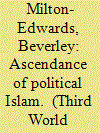

|
|
|
|
|
| Publication |
2008.
|
| Summary/Abstract |
This article outlines the means by which the Palestinian Islamic movement Hamas has developed and implemented a consolidation of power strategy that is inexorably driving it to a state of increasingly authoritarian control in the Gaza Strip. It discusses the factors that have driven Hamas in terms of power seeking as primordial to all radical Islamist movements or as a result of or response to other factors outside its control. The article highlights the concurrent demise of the Fatah organisation in the Gaza Strip as the largest and most visible symbol of secularism. It then reflects on the role of external, including international, actors in accelerating consolidation tactics following the Hamas 'takeover' of power from the Fatah-dominated institutions of the Palestinian Authority (PA) in June 2007. The article aims to demonstrate that Hamas' control in Gaza is an important signpost in terms of developing Islamism in the Middle East region.
|
|
|
|
|
|
|
|
|
|
|
|
|
|
|
|
| 2 |
ID:
085183


|
|
|
|
|
| Summary/Abstract |
This article examines the recent trend among Northern development organisations to represent development as sexy in awareness and fundraising campaigns. The article argues that the ways in which development organisations represent the global South and development work play an important role in the construction of social power relations between people in the global North and the global South. The representation of development as sexy is compared and contrasted to other representations of development that highlight scarcity and deprivation. The article argues that, although the representation of development as sexy avoids portrayals of poor people in the global South as helpless victims, it presents an image of development in which the most important form of agency is Northern charity.
|
|
|
|
|
|
|
|
|
|
|
|
|
|
|
|
| 3 |
ID:
085184
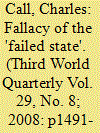

|
|
|
|
|
| Publication |
2008.
|
| Summary/Abstract |
This article examines the origins and evolution of the concepts of 'failed' and 'failing' states, arguing that the terms have come to be used in such widely divergent and problematic ways that they have lost any utility. The article details six serious problems with the term 'state failure' and related terms like 'fragile' or 'troubled' states, concluding that analysts should abandon these terms. It concludes with a modest attempt to develop alternative concepts and principles for thinking about diverse states that pose varied challenges for academic analysis and policy makers
|
|
|
|
|
|
|
|
|
|
|
|
|
|
|
|
| 4 |
ID:
085188
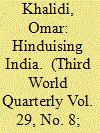

|
|
|
|
|
| Publication |
2008.
|
| Summary/Abstract |
This paper challenges the academic and media consensus on the notion that India is a secular state. It does so by marshalling empirical evidence that, far from being a state practising neutrality between the religious affiliations of Indian society or equidistance from all religions, the Indian state is actually and directly involved in Hinduisation of the country. It does this by promoting Hinduism through 'reform' and favouritism at state expense. While the constitution guarantees educational and cultural autonomy as well as religious freedom, in practice there are widespread and systematic violations by state institutions. In public employment the state follows discriminatory policies to perpetuate the Hindu majority by restricting religious freedom. The discriminatory policies are most visible in affirmative action policies and recruitment in the army. Contrary to some academic writings, the paper establishes that the Hinduisation of the Indian state is not only associated with the votaries of Hindutva represented by a 'family', or parivar, of Hindu militant groups. The notion of India as a Hindu state pre-dates the creation of the postcolonial state in 1947, and was inherent in the militant right wing of the Congress Party, which perceived Christians and Muslims as foreigners. There is, the paper demonstrates, major continuity between the educational, cultural and employment policies pursued by the Indian state regardless of the party in power. The paper is based on primary Indian sources and interviews in India and abroad.
|
|
|
|
|
|
|
|
|
|
|
|
|
|
|
|
| 5 |
ID:
085190
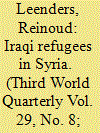

|
|
|
|
|
| Publication |
2008.
|
| Summary/Abstract |
This article explores the implications of the Iraqi refugee crisis for Syria, which is believed to host up to 1.5 million Iraqi refugees. Many policy makers, activists and analysts, sometimes inspired by the conflict repercussions of refugee crises witnessed elsewhere, have warned against the regional security impact of the Iraqi exodus and consequently speculated about a possible spillover of the armed conflicts in Iraq to its neighbours. The article presents an analysis of the characteristics and composition of the Iraqi refugee population and provides an assessment of responses to the refugee crisis in Syria. Its main finding is that fears for a spillover of Iraq's violence cannot be corroborated. The relative absence of refugee violence can be explained in reference to Iraqi refugees themselves. Given their specific demographic and social traits (including age composition, educational levels and professions, and to some extent religious affiliation), in addition to refugees' sectarian segregation, an overwhelming majority of Iraqi refugees are and remain victims of the violence in Iraq; they are unlikely to become its perpetrators abroad.
|
|
|
|
|
|
|
|
|
|
|
|
|
|
|
|
| 6 |
ID:
085192


|
|
|
|
|
| Publication |
2008.
|
| Summary/Abstract |
This paper argues that the Rwandan government's reconciliation strategy will need to be accompanied by a process of democratisation if it is to achieve its objective of fostering long-term peace. If the discourse of national unity is not reflected in an effective sharing of political power and economic resources, it is likely to be perceived with suspicion or even rejection by the country's largely Hutu population, and could contribute to aggravating ethnic tensions. Last time Rwanda-under pressure from the international community-undertook a democratisation process, however, this contributed to exacerbating the ethnic tensions that led to the genocide. Today Rwanda and its international donors thus face a stark trade-off between short-term stability and long-term peace: the longer the country puts off necessary democratic reform for fear of upsetting stability, the greater the risk of a rejection of government policies by the population and of a renewed manipulation of ethnicity in the future
|
|
|
|
|
|
|
|
|
|
|
|
|
|
|
|
| 7 |
ID:
085185


|
|
|
|
|
| Publication |
2008.
|
| Summary/Abstract |
After the Working Group on Climate Change and Development recognised the challenge that climate change poses to development, a number of environmental and aid, trade and development organisations formed a new politically active coalition, Stop Climate Chaos (SCC), to demand that stronger climate laws be adopted in the UK. The coalition now frames the issue of climate change as a 'global climate justice' one, emphasising the severity of the issue for people in poor countries, who will suffer the worst consequences, but have contributed least to it. The extent to which SCC member organisations address climate change as a global justice issue is explored through a content analysis of their websites, and a survey of participants in the SCC I-Count march, London, 3 November 2006. There is certainly evidence that environmental organisations are 'facing South', just as aid, trade and development organisations are 'turning green'.
|
|
|
|
|
|
|
|
|
|
|
|
|
|
|
|
| 8 |
ID:
085187
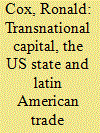

|
|
|
|
|
| Publication |
2008.
|
| Summary/Abstract |
This paper examines the role of US-based transnational corporations in advancing trade, investment, regulatory and intellectual property rights provisions within NAFTA and DR-CAFTA. I explore the linkages between US firms, the US state and investment patterns in Mexico, Central America and the Dominican Republic in order to develop a framework for understanding the political economy of these regional trade agreements. I locate the timing of each of these agreements within the context of the goals of a transnational interest bloc that includes US-based transnational firms, US state officials and regional business interests and state bureaucracies in Latin America, with each trying to utilise regional agreements as a substitute for failed multilateral initiatives as well as a springboard for advancing a more aggressive set of protections for investors within bilateral investment treaties. In order to determine the extent to which transnational firms based in the USA have influenced these trade agreements, I explore three interrelated aspects of business influence: the extent to which transnational firms with investment interests in Mexico and Central America were involved in organisations that had regular access to key US policy makers; the historical development of a transnational interest bloc that has linked US firms and the US state to transnational capital and state bureaucracies in Mexico, Central America and the Dominican Republic; and the extent to which the same group of transnational firms has been attempting without success to advance a policy agenda in the WTO that incorporates many of the provisions of NAFTA and DR-CAFTA. The failure of this transnational interest bloc to effect substantial changes in WTO policies has led the bloc to rely on regional trade agreements to pursue its interests.
|
|
|
|
|
|
|
|
|
|
|
|
|
|
|
|
|
|
|
|
|